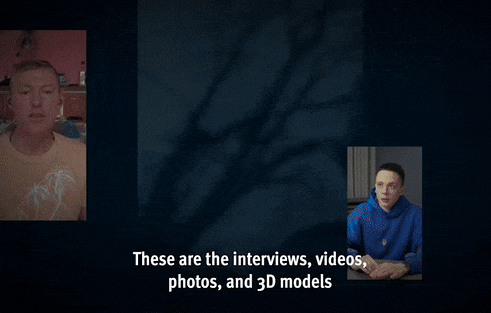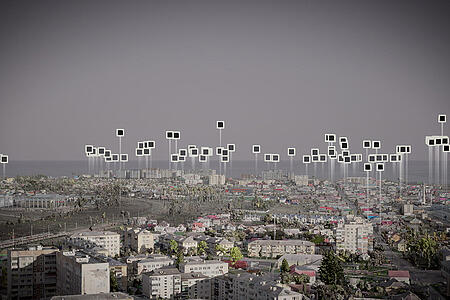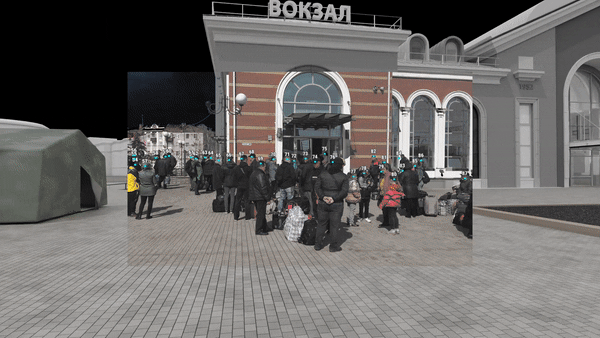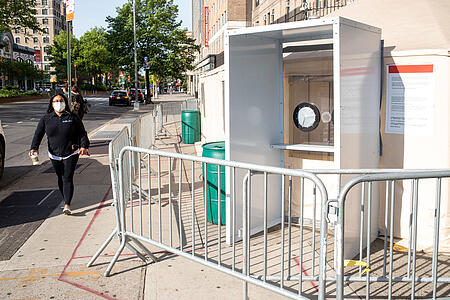Human Rights Watch, Truth Hounds and SITU release “Ukraine: New Findings on Russia's Devastation of Mariupol,” A War Crimes Inquiry Needed into Massive Loss of Civilian Life, Infrastructure
February 8th 2024Content Warning: This project includes disturbing content. Viewers should take extra care when watching the full video.
Access the full interactive feature
(Kyiv, February 8, 2024) – The Russian military assault on the Ukrainian city of Mariupol between February and May 2022 left thousands of civilians dead and injured, including many in apparently unlawful attacks, and trapped hundreds of thousands for weeks without basic services, Human Rights Watch, Truth Hounds, and SITU Research said in a report with extensive new findings released today. Russian President Vladimir Putin and other senior officials should be investigated and appropriately prosecuted for their role in apparent war crimes committed by Russian forces during the fighting there, and Russia should provide reparations to victims of laws-of-war violations and their families.
The 215-page report, “‘Our City Was Gone’: Russia’s Devastation of Mariupol, Ukraine,” an accompanying digital multimedia feature, and a 20-minute video, analyze the civilian suffering and damage to thousands of buildings, including several hundred high-rise apartments, hospitals, educational facilities, and electricity and water infrastructure. They describe repeated attempts by Ukrainian officials and international agencies to organize official evacuations and aid deliveries in the face of Russian obstruction.
“Russian forces’ devastation of Mariupol stands out as one of the worst chapters of their full-scale invasion of Ukraine,” said Ida Sawyer, crisis and conflict director at Human Rights Watch. “International bodies and governments committed to justice should focus on investigating the senior Russian officials who appear linked to overseeing war crimes in this once vibrant city.”
The report is based on 240 interviews with mostly displaced Mariupol residents by Human Rights Watch and Truth Hounds, a leading Ukrainian human rights organization, and an analysis of over 850 photos and videos, documents, and dozens of satellite images by Human Rights Watch and SITU Research. The digital multimedia feature includes 3D reconstructions of seven buildings damaged in apparently unlawful attacks, graphics on damaged schools and hospitals, and an analysis of grave sites to help estimate the death toll.
The groups documented in detail 14 attacks that damaged or destroyed 18 buildings, killing and injuring civilians. They include attacks that struck two hospitals, the city’s drama theater sheltering civilians, a food storage facility, an aid distribution site, a supermarket, and residential buildings serving as shelters. In those attacks, Human Rights Watch and Truth Hounds found either no evidence of a Ukrainian military presence in or near the structures hit or only a minor military presence, making them apparently unlawful.
In one case, a man who helped rescue survivors and retrieve bodies from the rubble of a residential building after it was struck on March 13, 2022, described what he saw. “The building was simply pulverized,” he said. “There was almost nothing left, just part of a bathroom and part of a corridor…. [A man next to his dead mother] was covered in blood. He had blood coming out of his ears, nose, and eyes, and was crying.… [Another man] was holding his lifeless child and was talking to him. He kept saying, ‘The child is not crying.’” The attack killed eight civilians and injured three others.
“Despite the challenges of investigating war crimes in areas made inaccessible by Russian occupation, we and our partners have spent nearly two years uncovering the truth about the horrific crimes committed by Russian forces in Mariupol,” said Roman Avramenko, executive director of Truth Hounds. “This investigation aims to ensure that these crimes will never be forgotten and that the perpetrators will face justice.”
The analysis of satellite imagery, photos, and videos of the city’s main cemeteries found that more than 10,000 people were buried in Mariupol between March 2022 and February 2023. By comparing the growth in graves with the city’s normal mortality rate, the groups estimate that at least 8,000 people died from fighting or war-related causes, though how many of those were civilians remains unknown.
The total number of dead may be significantly higher: some graves contained multiple bodies and the remains of others were most likely buried in rubble. Some may remain in makeshift graves, and others may have died later of war-related causes. Some relatives of those missing are still looking for their loved ones.
Thousands of people were injured, many of whom lost limbs, eyesight, hearing, or memory, including from traumatic brain injuries caused by explosions.
The report identifies 17 units of Russian and Russia-affiliated forces that were operating in Mariupol in March and April 2022, at the height of the fighting.
The groups also identified 10 people who as a matter of command responsibility may be criminally liable for war crimes relating to unlawful attacks and the possible arbitrary blocking of humanitarian aid and evacuations. They may also have committed war crimes and possible crimes against humanity for the forced transfer of Mariupol residents to Russia and Russia-occupied territory. Under the principle of command responsibility, a superior is responsible for crimes committed by their subordinates when they knew or should have known that the crimes were being committed but failed to take reasonable measures to stop or punish them.
On December 4, 2023, Human Rights Watch sent the Russian government a summary of the report’s findings and a list of questions but, as of February 1, had not received a response.
Since occupying the city, Russian authorities have been constructing new high-rise apartment buildings as part of their stated plan to rebuild and redevelop Mariupol by 2035. An occupying power should clear debris and demolish unsafe structures to protect the population. However, in the absence of independent investigators, the Russian government is erasing physical evidence at hundreds of potential crime scenes.
Occupying forces are also stripping away markers of Ukrainian identity, including by enforcing a Russian school curriculum and renaming streets. They are requiring residents to obtain Russian passports to apply for certain jobs and benefits.
In Mariupol, like elsewhere in Ukraine, Russian and affiliated forces extensively used explosive weapons with wide-area effects, including tank shelling and heavy artillery, multi-barrel rocket launchers, missiles, and airstrikes in populated areas. The use of such weapons in populated areas, with devastating impacts on civilians and civilian infrastructure, heightens concerns of unlawfully indiscriminate and disproportionate attacks.
“Mariupol stands as a testament to the cruel destruction and suffering caused by explosive weapons in cities and towns across the world,” Sawyer said. “All governments should support justice for crimes committed in Ukraine and sign the international declaration condemning the use of explosive weapons in populated areas."
The report “‘Our City Was Gone’: Russia’s Devastation of Mariupol, Ukraine” will be available at:
https://www.hrw.org/feature/russia-ukraine-war-mariupol/report
The digital multimedia feature “‘Beneath the Rubble’: Documenting Devastation and Loss in Mariupol” will be available at:
https://www.hrw.org/feature/russia-ukraine-war-mariupol
For more Human Rights Watch reporting on the Russia-Ukraine war, please visit:
https://www.hrw.org/tag/russia-ukraine-war
For more Human Rights Watch reporting on Ukraine, please visit:
https://www.hrw.org/europe/central-asia/ukraine
For more Human Rights Watch reporting on Russia, please visit:
https://www.hrw.org/europe/central-asia/russia
For more information, please contact:
For Human Rights Watch, in Kyiv, Ida Sawyer (English, French): +1-917-213-0939 (mobile); or sawyeri@hrw.org. Twitter @ida_sawyer
For Human Rights Watch, in Geneva, Gerry Simpson (English, French, German, Spanish):
+1-917-969-7982; or simpsog@hrw.org. Twitter: @GerrySimpsonHRW
For Human Rights Watch, in Berlin, Sam Dubberley: +1-917-581-1772; or dubbers@hrw.org. Twitter: @samdubberley
For Truth Hounds, in Kyiv, Daria Synelnikova (Ukrainian, English, Russian): +380-631-576-193; or d.synelnikova@truth-hounds.org.
For Human Rights Watch, in Berlin, Rich Weir (English): +1-646-740-1332 (mobile); or weirr@hrw.org. Twitter: @rich_weir
For Human Rights Watch, in Barcelona, Sophia Jones (English): +1-646-627-5841; or joness@hrw.org. Twitter: @sophia_mjones
For Human Rights Watch, in Kyiv, Yulia Gorbunova (English, Russian, Ukrainian):
+1-917-385-4094; or gorbuny@hrw.org. Twitter: @yuliagorbunova_
For Human Rights Watch, in New York, Rachel Denber (English, Russian, French):
+1-917-916-1266 (mobile); or denberr@hrw.org. Twitter: @rachel_denber
For Human Rights Watch, in Berlin, Tanya Lokshina (Russian, English): +1-917-385-4274; or lokshina@hrw.org. Twitter: @TanyaLokshina
For SITU Research, in New York, Candice Strongwater (English): +1-718-237-5795 (office); or cstrongwater@situ.nyc. Twitter: @situ_research




